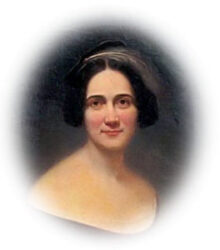September 19th.–My pink silk dress I have sold for $600, to be paid for in instalments, two hundred a month for three months. And I sell my eggs and butter from home for two hundred dollars a month. Does it not sound well –four hundred dollars a month regularly. But in what? In Confederate money. Hélas!
American Civil War Chronicles
Gen. Rodes killed
September 19, 2024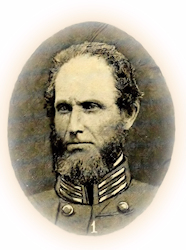
Sept. 19—Engage the enemy fiercely near Winchester and drive them, and they drive us. Gen. Rodes killed. Went into private house to see his body after he was brought into Winchester. His wife had spent some time in camp during preceding winter. We fall back to Strasburg, marching all night. Riding alone and very sad, at midnight, I overtake one or two thousand Federal prisoners. They began to sing, “We are going home to die no more.” My heart was touched. I shed tears as I thought many of them would die in Southern prisons. Get fifty Testaments, etc. Take position on breastworks near Strasburg.
Diary of a Southern Refugee, Judith White McGuire.
September 18, 2024
18th.—Nothing yet from Mr. –– about our rooms. All the furnished rooms that I have seen, except those, would cost us from $100 to $110 per month for each room, which, of course, we cannot pay; but we will try and not be anxious overmuch, for the Lord has never let us want comforts since we left our own dear home, and if we use the means which He has given us properly and in His fear, He will not desert us now.
I went with Mr. –– as usual this morning to the “Officers’ Hospital,” where he read a part of the service and delivered an address to such patients among the soldiers as were well enough to attend. I acted as his chorister, and when the services were over, and he went around to the bedsides of the patients, I crossed the street, as I have done several times before, to the cemetery—the old “Shockoe Hill Cemetery.” It is, to me, the most interesting spot in the city. It is a melancholy thought, that, after an absence of thirty years, I am almost a stranger in my native place. In this cemetery I go from spot to spot, and find the names that were the household words of my childhood and youth; the names of my father’s and mother’s friends; of the friends of my sisters, and of my own school-days. The first that struck me was that of the venerable and venerated Bishop Moore, on the monument erected by his church; then, that of his daughter, the admirable Miss Christian; then the monument to Colonel Ambler, erected by his children. Mrs. Ambler lies by him. Mr. and Mrs. Chapman Johnson, Judge and Mrs. Cabell, Mr. and Mrs. John Wickham, surrounded by their children, who were the companions of my youth; also, their lovely grand-daughter, Mrs. W. H. F. Lee, who [continue reading…]
0
September 18, 2024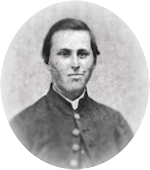
September 18th. Relieved from picket. Late in the day long wagon trains passed through town, some being parked here. Those passing on went to Harper’s Ferry. Things begin to take on a mysterious look which created much comment and talk among the boys. Either a battle was coming or Sheridan was to fall back. We had heard that Early was holding a strong position between the towns of Berryville and Winchester. All is quiet with us tonight.
Downing’s Civil War Diary.–Alexander G. Downing.
September 18, 2024
Sunday, 18th–Have had a week of very pleasant weather. Our store of supplies here is small, as the army is to evacuate the place as soon as possible.[1]
[1] This proved to be my last Sunday at Rome, Georgia, for which I was very thankful. While there I saw more sick and wounded men than I ever wish to see again. While I was a convalescent working among the sick, giving out different kinds of medicine to forty or fifty men, I was under great responsibility, and it cost me many a night’s sleep and rest.—A. G. D.
War Diary of Luman Harris Tenney.
September 18, 2024
18th. Sent regt. wagons loaded to Ferry. Preparations to move. 2nd Ohio made a reconnoissance, driving rebs across the Opequon. All Q. M.s ordered to Ferry with wagons. Houghton told me there was business on hand and the General would like me for aide. Soon an order came for me to report. I was pleased. Moved out and then back into camp over night.
A Rebel War Clerk’s Diary
September 18, 2024
SEPTEMBER 18TH–Cool and cloudy; symptoms of the equinoctial gale.
We have intelligence of another brilliant feat of Gen. Wade Hampton. Day before yesterday he got in the rear of the enemy, and drove off 2500 beeves and 400 prisoners. This will furnish fresh meat rations for Lee’s army during a portion of the fall campaign. I shall get some shanks, perhaps; and the prisoners of war will have meat rations.
Our people generally regard McClellan’s letter of acceptance as a war speech, and they are indifferent which succeeds, he or Lincoln, at the coming election; but they incline to the belief that McClellan will be beaten, because he did not announce himself in favor of peace, unconditionally, and our independence. My own opinion is that McClellan did what was best for him to do to secure his election, and that he will be elected. Then, if we maintain a strong front in the field, we shall have peace and independence. Yet his letter convinces me the peace party in the United States is not so strong as we supposed. If it shall appear that subjugation is not practicable, by future success on our part, the peace party will grow to commanding proportions.
Our currency was, yesterday, selling $25 for $1 in gold; and all of us who live on salaries live very badly: for food and everything else is governed by the specie value. Our $8000 per annum really is no more than $320 in gold. The rent of our house is the only item of expense not proportionably enlarged. It is $500, or $20 in gold. Gas is put up to $30 per 1000 feet.
Four P.M. We hear the deep booming of cannon again down the river. I hope the enemy will not get back the beeves we captured, and that my barrel of flour from North Carolina will not be intercepted!
J. J. Pollard’s contract to bring supplies through the lines, on the Mississippi, receiving cotton therefor, has been revoked, it being alleged by many in that region that the benefits reaped are by no means mutual.
And Mr. De Bow’s office of Cotton Loan Agent has been taken away from him for alleged irregularities, the nature of which is not clearly stated by the new Secretary of the Treasury, who announces his removal to the Secretary of War.
The President has had the porch of his house, from which his son fell, pulled down.
A “private” letter from Vice-President Stephens was received by Mr. Secretary Seddon to-day.
The cannonading ceased at sundown. The papers, to-morrow, will inform us what it was all about. Sunday is not respected in war, and I know not what is. Such terrible wars as this will probably make those who survive appreciate the blessings of peace.
Diary of Belle Edmondson
September 18, 2024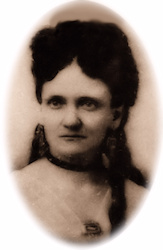
September, Sunday 18, 1864
All went to Church his morning except Lou, Mary Lou and I, we had a nice, quiet time. I fixed poor Lou’s afflicted head, and am really distressed she has taken that terible eruption.
Mr. and Mrs. Hamilton came down to Tea. We all walked down to the Tombigbee, had a delightful drink from the Artesian Well.
September 1 to 18, 1864
September 18, 2024
Sept. 1—Regiment on picket.
Friday, Sept. 2—Fast and pray.
Sept. 3—Day spent in line of battle.
Sept. 4—Move to Jordan’s Springs and spend p. m. in line of battle.
Sept. 5—Move and drive enemy on Pike and camp near Washington’s Farm.
Sept. 6—Rain, rain.
Sept. 7, 8, 9—In camp. Meet Rev Hetrick.
Sept. 10—Rodes and Ramseur move early to Bunker Hill.
Sept. 11—Rain. Division moves back and camps midway between Winchester and Bunker Hill.
Sept. 12—Meet Revs. Heterick, Rogers and Pitzer. Hold prayer meeting.
Sept. 13—Sup with Mrs. Silver. Meet Chaplain Stringfield and have prayer meeting at night.
Sept. 15—Regiment on picket.
Sept. 16—Fast and pray. Hold prayers.
Sunday, Sept. 18—Preach in a. m.
0
September 17, 2024
September 17th. Pleasant morning. Detailed for picket duty. Located northeast of town, between the Harper’s Ferry Pike and the Shenandoah River, on the ground where old John Brown was hung in 1859. About noontime saw a company of cavalrymen come flying down the pike from Harper’s Ferry. Wondered what it meant. Later we learned that General Grant and General Sheridan were in town. Caused much excitement and comment as they held a conference at a large house just southeast of town. The company I saw from our picket post was General Grant and his escort. All is quiet tonight.
Downing’s Civil War Diary.–Alexander G. Downing.
September 17, 2024
Saturday, 17th–The fight is all over and no one was hurt. The troops remained under arms all night to be in readiness for the rebels should they come across the river. Everything is quiet today.
War Diary of Luman Harris Tenney.
September 17, 2024
17th. Saturday. Got officers to sign papers. Forges get back loaded.
A Rebel War Clerk’s Diary
September 17, 2024
SEPTEMBER 17TH.–Bright and dry.
The demonstration of the enemy yesterday, on both sides of the river, was merely reconnoissances. Our pickets were driven in, but were soon re-established in their former positions.
The Secretary of War is now reaping plaudits from his friends, who are permitted to bring flour enough from the Valley to subsist their families twelve months. The poor men in the army (the rich are not in it) can get nothing for their families, and there is a prospect of their starving.
Gen. Hood is a prophet. I saw a letter from him, to-day, to the President, opposing Gen. Morgan’s last raid into Kentucky: predicting that if he returned at all, it would be with a demoralized handful of men–which turned out to be the case. He said if Morgan had been with Gen. Jones in the Valley, we might not have been compelled to confess a defeat, and lament the loss of a fine officer.
They do not take Confederate notes in the Valley, but sell flour for $8 per barrel in gold, which is equal to $200 in paper; and it costs nearly $100 to bring it here. Chickens are selling in market for $7 each, paper, or 37 ½ cents, specie.
Diary of Belle Edmondson
September 17, 2024
September, Saturday 17, 1864
Another cool day, spent very idly by all, playing cards most of the day—this evening Mary Lou, Mrs. James Young and I went in the Pond alone, Lou sitting on the bank looking on. Both my friends had gone out, I alone in, when a Company of Soldiers passed. I am sorry to say our Confederate Soldiers would so far forget themselves as to notice a Ladie in bathing, but more so to say those stoped and made several remarks loud enough to be heard. I was not uneasy, knowing the Officers would keep them straight.
Lou and I are going to take a dose of Medicine, as we are very much in Job’s fix—
Diary of a Southern Refugee, Judith White McGuire.
September 16, 2024
16th.—A visit to-day from my brother Dr. B., who bears the utter desolation of his home quietly, though so sudden a change of circumstances is of course very depressing. He tells me that he has lately had a visit from a very interesting young South Carolinian, who came to look for the body of his brother. The two brothers were being educated in Germany when the war broke out; and as soon as they were of military age, with the consent of their parents, they hastened home to take part in their country’s struggle. In one of the cavalry fights in Hanover, in May last, one brother was killed, and the other, “not being able to find the body at the time, was now seeking it.” His mother was on the ocean returning to her home, and he could not meet her with the information that her son’s body could not be found. He had heard that some of the fallen had been buried at S. H. or W. He mentioned that their intimate friend, young Middleton, had fallen in the same fight. Mr. Middleton had been buried at S. H., and his grave had been marked by Mrs. N.; but young Pringle (the name of the brothers) had been carried to neither place. Mr. Pringle had seen in a New York paper an account given by a Yankee officer of several wounded Confederates who had been captured, and having died on their way to the “White House,” they were buried by the roadside, and he had some reason to believe that his brother was among them. It was then remembered that there were three graves on the opposite side of the Pamunky River, and one was marked with the name “Tingle.” It was an excessively warm Sunday morning; but as the young soldier’s furlough only extended to the following day, there was no time to be lost. Dr. B. and the brother set out [continue reading…]
Robert M. McGill
September 16, 2024
Friday, 16th.—Inspection. Some talk of moving towards Alabama.
(Note: picture is of an unidentified Confederate soldier.)
0
September 16, 2024
September 16th. All is quiet in camp and on picket duty. General Sheridan and the main part of the army are near Winchester. Long wagon trains with supplies pass through town, to and from the main army. Must be kept well guarded. Guerillas are liable to attack the trains at most any point and time. One can get a good view of the valley and surrounding country from the mountains and hills.
Downing’s Civil War Diary.–Alexander G. Downing.
September 16, 2024
Friday, 16th–There was quite an excitement early this morning when it was learned that the rebel cavalry was indeed here. All the convalescents in the hospital were armed and ordered out into the rifle pits. Wheeler’s cavalry were in plain view across the river north of town. They did not come across, however, as they discovered that our garrison was in shape to give them a warm reception. All is quiet at present.
War Diary of Luman Harris Tenney.
September 16, 2024
16th. Remained in camp. Read and wrote.
A Rebel War Clerk’s Diary
September 16, 2024
SEPTEMBER 16TH.–Bright and pleasant–the weather.
Gen. Hood telegraphs that his army is so much mortified at the feeble resistance it made to Sherman, that he is certain it will fight better the next time.
Mr. Benjamin asks a passport and transportation for Mrs. Jane L. Brant, who goes to Europe in the employment of the government.
Gen. Morgan’s funeral took place to-day. None were allowed to see him; for the coffin was not opened. On the way to Hollywood Cemetery, Gen. Ewell received a dispatch that our pickets were driven in at Chaffin’s Farm. This demonstration of the enemy compelled him to withdraw the military portion of the procession, and they were hurried off to the battle-field.
The local troops (clerks, etc.) are ordered to assemble at 5 P.M. to day. What does Grant mean? He chooses a good time, if he means anything serious; for our people, and many of the troops, are a little despondent. They are censuring the President again, whose popularity ebbs and flows.
Diary of Belle Edmondson
September 16, 2024
September, Friday 16, 1864
Autumn is fast approaching, today has been quite cool—We have spent the day as usual delightfully at Waverly. Cards being order of the day—A delightful bath, though rather cool—I made Maj. Cheatham a nice Chess bag.
0
September 15, 2024
September 15th. Weather fine. At this time duty is light in our camp near this town. Getting all the comfort we can out of our soldier life. Writing many letters to friends in good old Connecticut.
Downing’s Civil War Diary.–Alexander G. Downing.
September 15, 2024
Thursday, 15th–The day has been pleasant. It is reported that the rebel cavalry is in strong force in this vicinity and it is a good thing that the expedition returned when it did.
War Diary of Luman Harris Tenney.
September 15, 2024
15th. Thursday. Returned to Berryville. Rode rapidly without company most of the way.
Diary of David L. Day.
September 15, 2024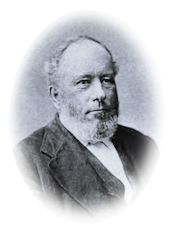
We Leave Virginia.
Newbern, Sept. 15. On the 5th of this month the 23d and 25th Massachusetts embarked on the steamer Winona, from Bermuda Hundred bound for Newbern. The 9th New Jersey and 27th Massachusetts embarked on another boat at the same time for the same destination. On the morning of the 6th we ran up to Portsmouth, taking our camp equipage and knapsacks aboard, and ran back into Hampton Roads and anchored. There was a heavy storm blowing outside and we lay at our anchorage all day the 7th. On the 8th we steamed up and anchored off Fortress Monroe, but soon received orders to put out to sea. The captains of both boats objected to going, saying it was too rough to venture outside. On the morning of the 9th we received peremptory orders to pull up our mudhooks and start. Then ensued a sharp correspondence between our captain and some one in the fort, said to be Gen. Butler, and it certainly sounded a great deal like him. The captain objected to taking out his boat on the ground that she was only a light river boat and entirely unfit for an ocean trip, and besides was only chartered for the bay and rivers, and he did not feel like taking her out without first consulting her owners at Baltimore. Word came back that it made no difference about the owners or for what she was chartered, the boat was going to Newbern or go to pieces. In this dilemma the captain said that the boat might go but that he shouldn’t take the responsibility of taking her out. Soon word came back that he would take her out, or go into the fort, wearing a ball and chain. The captain, finding himself of no more account than a common soldier, was obliged to accept the situation. Toward night our consort, which was a sea-going boat, led off, we following after.
I felt a little nervous about going out to sea in so frail a craft, and thought it rather rough that after having gone through what we had we should be taken out to sea and drowned. I comforted myself with the thought that soldiers were not supposed to have any choice in the manner of their death. We found it rough going round Cape Henry, as there is almost always a chop sea there even in mild weather. Getting around the cape, we [continue reading…]
